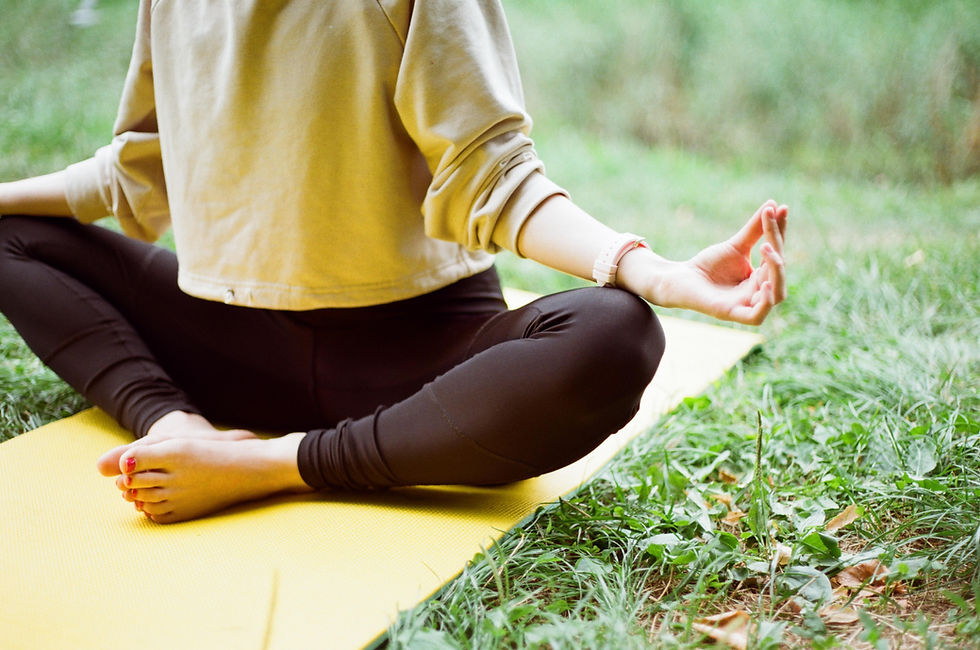Reflections on Silence
- Ellen M Patrick

- Oct 4, 2021
- 4 min read
Updated: Dec 23, 2021
A journal excerpt from my first 7-day silent Mindfulness Meditation retreat reads:
"Morning meditation was challenging. The first 20 minutes were fine, but then restlessness, discomfort and fidgeting set in. I reminded myself to focus on m y breath and just be with the discomfort...it would pass. In the meantime, how am I relating to the discomfort? Then, the chatter: "How long is this meditation? I thought it was only a 1/2 hour! oh, God, don't tell me it's 45 minutes! I can't sit still that long! Oye! Why am I so cold? Yesterday it was much warmer in this room. Is it time for breakfast? My feet are freezing! Wonder what will be served for breakfast? My feet are freezing! Wonder what will be served for breakfast? Ooops! I'm suppose to be meditating!" OK, awareness is back on the breath. Thankfully, every breath is an opportunity to start over?
Yes, that was what my first silent meditation retreat looked like. The fact that I even went to a silent retreat required Herculean effort, as I’ve never really been know to be the quiet type. In grammar school I received good grades, but the teachers would tell my parents that my conduct needed improvement as I was always talking, passing notes to my friends and basically disturbing the focus of the class. Pretty much what my meditation practice looks like, too!
So what does 7 days of silence feel like? The silence gave me permission to stay in my own experience—to direct my energy inwards. I did not feel obligated to make small talk. The silence paved the way for me to cultivate a process of decompression and nourishment to support my spiritual growth. Upon further reflection, the following stands out:

4 Ways a Silent Meditation Retreat Can Support Your Well-being & Spiritual Growth
1. Nervous system regulation
We are all subjected to a cacophony of information and distractions on a daily, if not hourly basis. In fact, the amount of information we are exposed to in 1 day is the equivalent of what a person 100 years ago would be exposed to in a whole lifetime! So it was no surprise that during the first 2 days of the retreat, I observed random twitching of my limbs as high voltage, energetic stimulus exited my body. Given permission to turn off my electronic devices and experience the quiet of a remote mountaintop location, invited my nervous system to turn off its sympathetic “fight or flight” switch and begin to find shelter in the arms of the parasympathetic “rest and repose” embrace.
2. Clearing out of extraneous thoughts
As my nervous system relaxed over the course of the next couple of days, my mind started purging a bunch of extraneous thoughts that moved up and out. None of the thoughts were important or required action. They were just remnants of my mind processing information from the input of my 5 senses. Gradually, these thoughts slowed down and were more of a whisper than a yell trying to distract and capture my mind’s attention.
3. Deep dive into experiences that have shaped me
After about 4 or 5 days, the thoughts that popped up were random memories. Situations and experiences I haven’t thought about in years! As I reflected, I realized these memories were a part of what has shaped me as a person. For example, triggered by a Linda Ronstadt song stuck in my head, I remembered being sexually accosted by an older man at my friend’s high school graduation party. It made me feel so guilty at the time (pre #metoo movement). Then sad thoughts of my aging dog triggered the memory of my dad’s passing and how important it was for me to comfort him as he transitioned, and to cultivate compassion for myself during this stressfully sad experience. To reflect into these kinds of memories gave me the opportunity to understand myself on a deep level.
4. Spiritual download
With a mind that has become more quiet and focused, I am more open to the cultivation of intuition and spiritual guidance. I find myself more trusting of the wisdom of the universe and my own intuition. I embrace, in the words of St. Therese, that I am “exactly where I am suppose to be.” It is in the silence that the profound listening and deep understanding take place.
Despite the logistical challenge to create time every day, I come to my cushion to find quiet and calm. Each day is an opportunity to reflect, to pause and to understand the workings of my mind. As a yoga teacher, I, all too often, hear the comment, “I can’t meditate, my mind is too busy!” Well, welcome to the club! After teaching yoga for almost 20 years, I still find the need to practice calming and focusing my mind. And, I accept that this will be a life-long practice and essential tool to navigate the hyper-distracting world in which we now live. Meditation cultivates a more intuitive intention of responding to the circumstances of our lives as human beings, so as to influence our lives onto a more positive and joyful course.




Comments